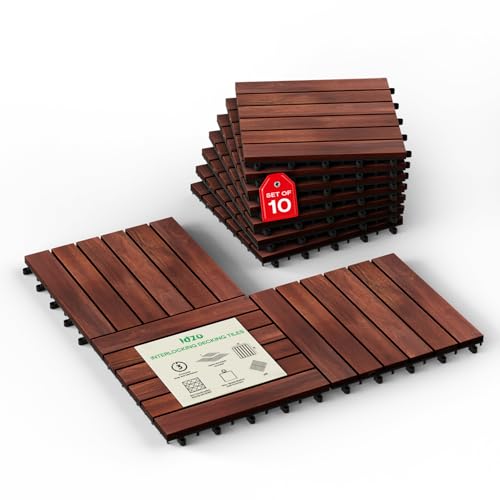Deciding to add a deck to your home is an exciting project that can transform your outdoor space. I’ve been there, weighing the options between traditional wood and modern composite materials. Each choice comes with its own set of benefits and considerations.

Wood decks offer that classic, natural look that many homeowners love. They’re versatile and can be customized to fit any style. On the other hand, composite decks promise lower maintenance and longer durability, which is tempting if you prefer a hassle-free outdoor area.
In this article, I’ll walk you through the pros and cons of wood versus composite decking to help you make an informed decision that’s perfect for your lifestyle and budget.
Wood Decks
Wood decks offer a natural and timeless appeal to any outdoor space. They provide versatile design options that can be customized to fit your home’s style.
Pros
- Aesthetic Appeal: Natural grains and textures enhance visual appeal
- Customization: Easily stained or painted to match any color scheme
- Cost-Effective: Generally less expensive upfront compared to composite materials
- Ease of Installation: Familiar materials simplify the building process
- Natural Feel: Provides a warm and authentic outdoor environment
Cons
- Maintenance Requirements: Regular sealing and staining needed to prevent damage
- Susceptible to Weather: Prone to warping, cracking, and splintering over time
- Lifespan: Typically lasts 15-20 years with proper maintenance
- Insect and Rot Risks: Vulnerable to termites and moisture-related issues
- Color Fading: Exposure to sunlight can cause colors to fade unevenly
Composite Decks
I find composite decks offer a modern alternative to traditional wood, blending aesthetics with practicality. They provide a durable, low-maintenance surface suitable for various climates.
Pros
- Low Maintenance: I appreciate that composite decks only need periodic cleaning with soap and water, eliminating the need for sealing or staining.
- Durability: They resist rot, splintering, and insect damage, extending the deck’s lifespan beyond 25 years.
- Eco-Friendly Options: Many composites are made from recycled wood and plastic, reducing environmental impact.
- Variety of Styles and Colors: With numerous colors and finishes available, I can customize my deck without worrying about wood fading.
- Slip-Resistant Surfaces: The engineered textures reduce slipping, especially in wet conditions, enhancing safety.
Cons
- Higher Initial Cost: Composite decking typically costs more upfront compared to wood, impacting my initial budget.
- Potential for Heat Retention: Composite materials can become hot under direct sunlight, making the deck less comfortable during peak temperatures.
- Limited DIY Installation: Installation may require specialized tools or professional help, increasing overall project costs.
- Possible Appearance Limitations: While diverse, composite decks might lack the natural grain and warmth of genuine wood, affecting my aesthetic preferences.
- Fading Over Time: Although more resistant than wood, composite decks can still fade after prolonged sun exposure, requiring periodic maintenance.
Cost Analysis
Analyzing costs helps determine the most suitable decking option. Wood and composite decks differ significantly in initial expenses, maintenance requirements, and long-term investments.
Initial Costs
Wood decks typically cost between $15 and $35 per square foot for materials. Installation adds another $8 to $15 per square foot. Composite decks range from $30 to $45 per square foot for materials, with installation costs ranging from $10 to $20 per square foot.
| Cost Category | Wood Deck | Composite Deck |
|---|---|---|
| Material Cost | $15 – $35/sq ft | $30 – $45/sq ft |
| Installation Cost | $8 – $15/sq ft | $10 – $20/sq ft |
Maintenance Costs
Wood decks require annual maintenance, including sealing and repairs, averaging $200 to $500 each year. Composite decks demand minimal upkeep, costing approximately $0 to $100 annually.
Lifespan and Total Costs
Wood decks have a lifespan of 15 to 20 years, leading to total costs ranging from $5,000 to $15,000. Composite decks last between 25 and 30 years, with total costs between $7,500 and $20,000, depending on quality and installation.
| Cost Category | Wood Deck | Composite Deck |
|---|---|---|
| Lifespan | 15 – 20 years | 25 – 30 years |
| Total Cost | $5,000 – $15,000 | $7,500 – $20,000 |
Understanding these cost factors clarifies the financial implications of choosing between wood and composite decking, aligning your decision with budget and long-term value.
Installation Considerations
Installing a deck involves several factors that differ between wood and composite materials. Understanding these considerations helps in planning a successful installation.
Tools and Equipment
Wood decks require common carpentry tools such as saws, drills, and nail guns. In contrast, composite decks may need specialized cutting tools and fastening systems designed for the material.
Skill Level and DIY Potential
Wood decks are generally easier for DIY projects because they use standard installation techniques. Composite decks often require precise measurements and specific installation methods, making professional help advisable.
Time and Labor
Installing a wood deck typically takes 2 to 4 weeks, depending on the size and complexity. Composite decks may extend the timeline to 4 to 6 weeks due to material handling and specialized installation processes.
Cost Implications
While initial material costs vary, labor expenses also differ between wood and composite decks. Here’s a breakdown:
| Aspect | Wood Decks | Composite Decks |
|---|---|---|
| Material Cost | $15-$35 per sq ft | $30-$45 per sq ft |
| Installation Cost | $8-$15 per sq ft | $10-$20 per sq ft |
| Total Installation | Varies by size | Varies by size |
Maintenance Requirements
Wood decks demand regular maintenance, including sealing and staining every 1-2 years. Composite decks require minimal upkeep, such as occasional cleaning with soap and water.
Environmental Factors
Wood decks are susceptible to moisture and insect damage, necessitating proper installation and protection. Composite decks resist these issues but may retain heat in direct sunlight, affecting their comfort and usability.
Longevity and Durability
Wood decks last 15 to 20 years with proper maintenance. Composite decks have a longer lifespan of 25 to 30 years, offering greater durability against weather and wear.
Aesthetic Flexibility
Wood decks offer more customization options in terms of stains, paints, and designs. Composite decks provide a variety of colors and finishes but may have limited design flexibility compared to wood.
« Building a Raised Garden Bed: Simple DIY Tips for a Beautiful Garden Essential Guide to Caring for Cacti in Outdoor Beds: Expert Tips »
By considering these installation factors, you can choose the decking material that best fits your project’s needs and your personal preferences.
Maintenance Requirements
Maintaining your deck ensures its longevity and keeps it looking great. Here’s how wood and composite decks compare in terms of maintenance:
Wood Decks
- Regular Sealing and Staining: I apply a sealant or stain every 1 to 3 years to protect the wood from moisture and UV damage.
- Cleaning: I sweep debris weekly and perform a deep clean annually using a deck cleaner to prevent mold and mildew growth.
- Inspection and Repairs: I inspect the deck quarterly for signs of rot, insect damage, or loose boards, making necessary repairs promptly.
- Annual Costs: Maintenance for wood decks typically ranges from $200 to $500 each year.
Composite Decks
- Occasional Cleaning: I sweep debris regularly and wash the deck with soap and water every few months to remove dirt and prevent staining.
- No Sealing Required: Composite materials resist moisture and UV rays, eliminating the need for sealing or staining.
- Minimal Repairs: I check for any scratches or minor damages and address them as needed, though repairs are infrequent.
- Annual Costs: Maintenance costs for composite decks usually range from $0 to $100 each year.
Maintenance Comparison
| Maintenance Task | Wood Decks | Composite Decks |
|---|---|---|
| Sealing/Staining | Every 1-3 years | Not required |
| Regular Cleaning | Weekly sweeping, annual deep clean | Sweep regularly, wash periodically |
| Inspection and Repairs | Quarterly inspections | Occasional inspections |
| Annual Maintenance Cost | $200 – $500 | $0 – $100 |
Choosing between wood and composite decks involves considering the maintenance commitment. Wood decks offer a natural look but require consistent upkeep, while composite decks provide a low-maintenance alternative with durable performance.
Conclusion
Choosing between wood and composite decks really depends on what matters most to you. If you love the natural look and enjoy a project you can personalize, wood might be the way to go. On the other hand composite decks offer hassle-free maintenance and long-lasting durability which can be a big plus. I’ve found that weighing the initial costs against long-term benefits helps in making the right decision. Whatever you choose your new deck is sure to enhance your outdoor living space and provide a lovely spot to enjoy the moments that matter.
















